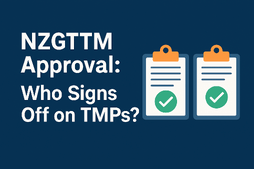Since the release of the New Zealand Guide to Temporary Traffic Management (NZGTTM) by NZTA, there’s been ongoing confusion around who is responsible for approving Traffic Management Plans (TMPs). Is it the PCBU chain (those paying for or doing the work), or the Road Controlling Authority (RCA)—typically the Traffic Management Coordinator (TMC)?
In short: it’s both. And that’s where the confusion begins.
Why the Confusion?
The initial version of NZGTTM contained a small but significant error. It implied that the PCBU chain alone approves the TMP, without clearly stating that the RCA must also approve certain aspects of the plan.
Some larger contractors interpreted this to mean that RCAs do not approve TMPs, citing their obligations under the Health and Safety at Work Act (HSWA). This interpretation spread across the industry, creating a myth that the RCA’s role in TMP approval was redundant.
Further confusion arose when NZTA’s TMP template titled the approval section as “Road Controlling Authority Acceptance,” which seemed to reinforce the idea that RCAs only accept, rather than approve, TMPs.
So, Who Actually Approves the TMP?
Both the PCBU chain and the RCA must approve TMPs - but they approve different aspects.
PCBU Chain Approval:
The PCBU chain is responsible for approving the methodology and ensuring it is appropriate for the work being undertaken. This is why NZTA’s template includes a condition stating:
“The TMP provides, so far as reasonably practicable, a safe and fit-for-purpose TTM system.”
However, just because a contractor wants to implement a road closure or stop/go doesn’t mean they can just install one.
RCA Approval:
Roads are highly regulated infrastructure. RCAs have legal powers under various legislation to approve:
Traffic control devices (signs, markings, signals)
Road closures
Temporary speed limits (TSLs)
Portable traffic signals
Without RCA approval, these measures may not be legally enforceable. For example, road users could legally ignore a TSL or drive through a closure if it hasn’t been properly authorised. In addition, those undertaking the works may be issued fined and ordered to remove their work site.
Who in the PCBU Chain Approves?
It varies. From the RCA’s perspective, it doesn’t matter who signs off within the PCBU chain—they approve on behalf of the entire chain. Internally, the PCBU chain may define this through contract terms or company policies. The key is that all parties (client, lead contractor, subcontractors, etc.) are aligned on the proposed TTM.
Summary
PCBU Chain: Approves the TTM methodology to ensure it is safe and fit for purpose.
RCA: Provides regulatory approval for the TMP’s implementation, including traffic control devices and road closures.
Both approvals are essential.



